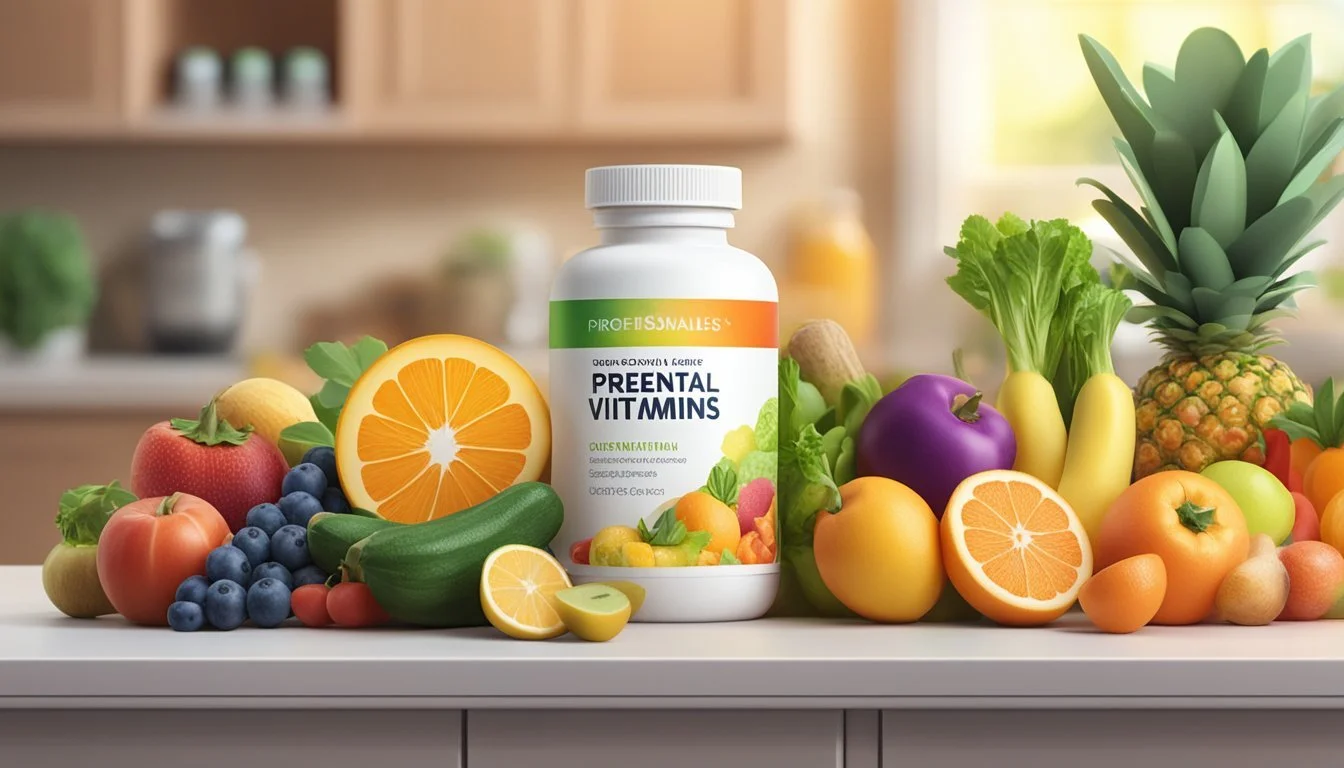Essential Vitamin Supplements for a Healthy Pregnancy: Expert Guide
Pregnancy is a crucial time for both mother and baby, making proper nutrition essential. Vitamin supplements play a vital role in supporting fetal development and maternal health. Prenatal vitamins typically contain a carefully balanced mix of nutrients, including folic acid, iron, calcium, and vitamin D, which are critical for the baby's growth and the mother's wellbeing.
Many healthcare providers recommend starting prenatal vitamins before conception. This early start ensures that important nutrients, such as folic acid, are present during the initial stages of fetal development. The neural tube, which becomes the brain and spinal cord, forms within the first month of pregnancy, often before a woman realizes she is pregnant.
B vitamins are particularly important during pregnancy. They provide energy for both the mother and the developing fetus, promote good vision, and help build the placenta. A comprehensive prenatal vitamin should include adequate amounts of B vitamins, especially B12, folate, and B6, to support these crucial functions.
Importance of Nutrients During Pregnancy
Proper nutrition during pregnancy is crucial for the health of both mother and baby. Adequate intake of vitamins, minerals, and other essential nutrients supports fetal growth and development while helping prevent potential complications.
Role of Vitamins and Minerals in Fetal Development
Folic acid plays a vital role in preventing neural tube defects like spina bifida. Pregnant women should consume 400-800 mcg daily through diet and supplements. Iron supports the increased blood volume and oxygen needs of the growing fetus. Calcium and vitamin D are essential for developing strong bones and teeth.
Vitamin C aids in iron absorption and supports immune function. Vitamin A contributes to eye development and immune health, but excessive amounts can be harmful. B vitamins, including B12, are crucial for energy production and fetal brain development.
Choline supports brain and spinal cord formation. Pregnant women need about 450 mg daily. Iodine is necessary for proper thyroid function and fetal brain development.
Preventing Nutrient Deficiencies and Birth Defects
Adequate nutrient intake reduces the risk of birth defects and complications. Folate deficiency can lead to neural tube defects, while iron deficiency may cause anemia and preterm birth. Low vitamin D levels are associated with pregnancy complications and poor fetal growth.
Zinc deficiency may increase the risk of preterm birth and low birth weight. Inadequate omega-3 fatty acids can impact fetal brain and eye development. Prenatal vitamins can help fill nutritional gaps, but should not replace a balanced diet.
A varied diet rich in fruits, vegetables, whole grains, lean proteins, and healthy fats provides essential nutrients. Women with specific dietary restrictions or health conditions may need additional supplementation as advised by their healthcare provider.
Optimal Dietary Patterns in Pregnancy
A balanced and nutrient-rich diet is crucial for supporting a healthy pregnancy. Focusing on key nutrients and food groups helps ensure proper fetal development and maternal health.
Balancing Macronutrients and Micronutrients
Pregnant women need a mix of carbohydrates, proteins, and fats to meet increased energy demands. Complex carbohydrates from whole grains provide sustained energy. Lean proteins support fetal growth and tissue development. Healthy fats, especially omega-3s, aid brain development.
Micronutrients are equally important. Folate prevents neural tube defects. Iron supports increased blood volume. Calcium and vitamin D strengthen bones. Iodine aids thyroid function.
Green leafy vegetables offer folate, iron, and other vitamins. Fruits provide antioxidants and fiber. Dairy or fortified plant-based alternatives supply calcium and vitamin D.
Incorporating a Variety of Food Groups
A diverse diet helps meet nutritional needs. Include:
Whole grains: brown rice, quinoa, oats
Lean proteins: chicken, fish, legumes, eggs
Fruits and vegetables: berries, citrus, leafy greens, bell peppers
Dairy or alternatives: milk, yogurt, fortified plant milks
Healthy fats: avocado, nuts, olive oil
Aim for colorful plates to ensure a range of nutrients. Stay hydrated with water and unsweetened beverages. Limit processed foods high in added sugars and unhealthy fats.
Navigating Dietary Restrictions and Allergies
Women with dietary restrictions or allergies may need extra planning to meet nutritional needs. Vegans should focus on plant-based protein sources and may require B12 supplements. Those with celiac disease must avoid gluten while ensuring adequate fiber and B vitamins.
For soy or wheat allergies, explore alternative protein and grain sources. Consult a registered dietitian to address nutritional gaps. They can help create meal plans that meet individual needs and preferences.
Avoid alcohol and limit caffeine. Stop smoking, as it can lead to poor nutrition absorption and fetal health risks. With careful planning, most dietary restrictions can be accommodated while maintaining a healthy pregnancy diet.
Supplements for a Healthy Pregnancy
Proper supplementation during pregnancy supports maternal health and fetal development. Key nutrients like folic acid, iron, and vitamin D play crucial roles in ensuring a healthy pregnancy.
Understanding Prenatal Vitamins
Prenatal vitamins are specially formulated to meet the increased nutritional needs of pregnant women. These supplements typically contain higher levels of folic acid, which is essential for preventing neural tube defects. Iron is another critical component, supporting the increased blood volume during pregnancy.
Most prenatal vitamins also include calcium and vitamin D for fetal bone development. B vitamins, particularly B6 and B12, are important for energy production and fetal brain development. Some formulations may contain choline, vital for fetal brain and spinal cord development.
Vitamin C, E, and zinc are often included to support the immune system and promote healthy tissue growth.
When and How to Take Supplements
Ideally, women should start taking prenatal vitamins before conception. Many healthcare providers recommend beginning supplementation at least a month before trying to conceive.
Taking prenatal vitamins with food can help reduce nausea, a common side effect. Some women find that taking their supplement before bed minimizes digestive discomfort.
It's important to follow the recommended dosage on the label or as advised by a healthcare provider. Over-supplementation can be harmful, especially with fat-soluble vitamins like A and D.
Customizing Supplementation to Individual Needs
Every pregnancy is unique, and nutritional needs can vary based on diet, lifestyle, and health conditions. Women with specific deficiencies may require additional supplementation.
For instance, vegetarians or vegans might need extra B12 or iron. Those with limited sun exposure may benefit from higher vitamin D doses.
Some women experience severe nausea during pregnancy. In these cases, ginger supplements or alternative prenatal formulations might be recommended.
Cost can be a factor when choosing supplements. While some high-end brands offer comprehensive formulas, many affordable options provide essential nutrients. Discussing options with a healthcare provider can help balance nutritional needs with budget constraints.
Managing Pregnancy Symptoms with Nutrition
Proper nutrition can help alleviate common pregnancy discomforts. Specific dietary adjustments and food choices can effectively address nausea and constipation, two frequent symptoms experienced by many expectant mothers.
Combatting Nausea with Dietary Adjustments
Nausea affects up to 80% of pregnant women, especially during the first trimester. Small, frequent meals can help stabilize blood sugar levels and reduce nausea. Bland, easily digestible foods like crackers or toast may be easier to tolerate.
Ginger has shown promise in alleviating pregnancy-related nausea. Pregnant women can try ginger tea, ginger ale, or ginger candies. Vitamin B6 supplements may also help reduce nausea, but should be taken under medical supervision.
Avoiding strong odors and greasy foods can prevent triggering nausea. Staying hydrated is crucial, so sipping water or sucking on ice chips throughout the day is recommended.
Addressing Constipation through Diet
Constipation is common during pregnancy due to hormonal changes and the growing uterus. Increasing fiber intake can help alleviate this symptom. Good sources of fiber include:
Whole grains
Fresh fruits and vegetables
Legumes
Nuts and seeds
Pregnant women should aim for 25-30 grams of fiber daily. Gradual increase in fiber intake is recommended to avoid gas and bloating.
Staying well-hydrated is essential for preventing constipation. Pregnant women should drink at least 8-10 glasses of water daily. Regular physical activity, as approved by a healthcare provider, can also promote healthy digestion.
Assessing Risks and Safety
Proper evaluation of vitamin supplements during pregnancy is crucial for maternal and fetal health. Understanding potential risks and appropriate dosages helps ensure safe supplementation.
Potential Risks of Over-Supplementation
Excessive intake of certain vitamins and minerals can pose risks during pregnancy. High doses of vitamin A may cause birth defects. Too much iron can lead to gastrointestinal issues and may increase oxidative stress. Excess vitamin E has been linked to heart defects in some studies.
Omega-3 fatty acids, while generally beneficial, should be taken in moderation. High doses may increase bleeding risk. Some herbal supplements can interact with medications or have unknown effects on fetal development.
Understanding Safe Dosages and Interactions
Prenatal vitamins are formulated to provide safe levels of essential nutrients. Folic acid (400-800 mcg daily) helps prevent neural tube defects. Iron (27 mg daily) supports increased blood volume and prevents anemia.
Vitamin D (600 IU daily) and calcium (1000 mg daily) promote bone health. DHA omega-3 (200-300 mg daily) aids fetal brain development. Consulting a healthcare provider is vital to determine individual needs and avoid potential interactions with medications.
Certain supplements may require adjustments based on pre-existing conditions or dietary intake. Regular blood tests can help monitor nutrient levels and guide supplementation strategies throughout pregnancy.
Professional Guidance and Resources
Expectant mothers should seek expert advice and reliable information when considering vitamin supplements during pregnancy. Healthcare providers and trusted organizations offer essential guidance to ensure optimal maternal and fetal health.
Consulting Healthcare Providers
Obstetricians and midwives play a crucial role in guiding pregnant women on vitamin supplementation. These professionals assess individual nutritional needs based on medical history, lifestyle, and dietary habits. They may recommend specific prenatal vitamins or additional supplements to address deficiencies.
Healthcare providers can:
Conduct blood tests to check nutrient levels
Adjust supplement recommendations as pregnancy progresses
Address concerns about supplement safety and interactions
Provide dosage instructions tailored to each patient
Regular prenatal checkups allow for ongoing monitoring and adjustment of supplementation plans.
Trusted Sources for Information on Supplements
Reputable organizations offer evidence-based information on pregnancy supplements. The Centers for Disease Control and Prevention (CDC) provides guidelines on folic acid intake and other essential nutrients. The Mayo Clinic offers comprehensive resources on prenatal nutrition and vitamin supplementation.
Key resources include:
CDC's website section on pregnancy and nutrition
Mayo Clinic's pregnancy nutrition guide
Women's health organizations' educational materials
These sources typically cover:
Recommended daily allowances for vitamins and minerals
Potential risks of over-supplementation
Food sources of essential nutrients
Latest research on prenatal supplementation
Pregnant women should cross-reference information from multiple trusted sources and discuss findings with their healthcare providers.





